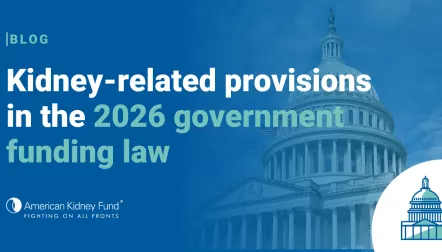
Blog post
A new bill to address health disparities: the Health Equity and Accountability Act

On April 26, Congresswoman Robin Kelly (D-IL), chair of the Congressional Black Caucus Health Braintrust, introduced the Health Equity and Accountability Act (HEAA), or H.R. 7585. This bill aims to make our health care system more equitable and accessible for everyone. It calls for Congress to create policies to address the connection between health inequities and demographic factors, including race and ethnicity, immigration status, age, disability, sex, gender, sexual orientation, gender identity and expression, language and socio-economic status. HEAA already has 59 cosponsors, as well as support from 60 stakeholder groups, including the American Kidney Fund (AKF).
At a press conference held by Rep. Kelly to announce the introduction of the bill, AKF's CEO, LaVarne A. Burton, gave a statement in support of HEAA and participated in a town hall discussion about health equity in the U.S. (pictured above). We were honored to be part of this event and to work with Rep. Kelly and her staff on this important legislation.
HEAA focuses on 10 topics related to health equity. One of those topics is "high impact minority diseases." In other words, diseases that affect people of color more than other populations, like kidney disease.
Kidney disease is the fastest-growing non-contagious disease in the U.S. For the roughly 810,000 Americans living with kidney failure at this moment, it is a life-altering condition that imposes enormous physical, emotional and financial burdens. While people of all races and ethnicities are equally likely to develop kidney disease, people of color are more likely to reach kidney failure and require dialysis or a transplant to survive. Black Americans represent 35% of those with kidney failure and Hispanic/Latino people are 1.5 times more likely to progress to kidney failure than non-Hispanic people.
HEAA includes provisions specifically aimed at addressing this health inequities for people with kidney disease. It will increase research into kidney disease in communities of color, encouraging the inclusion of more people of color in clinical trials and focusing on data sharing, genetic mapping and gene therapy. The bill will also create a national action plan to address kidney disease, as well as expand public health programs, increase use of home dialysis in communities of color, increase transplants for people of color and expand Medigap access for people with kidney failure.
Advancing health equity is one of AKF's top priorities. We are working on all fronts to help resolve the disproportionate impact that kidney failure has on communities underserved by our health system. We are grateful for the leadership of Rep. Robin Kelly and the members of the Congressional Tri-Caucus for their work to introduce this landmark legislation that will no doubt save lives.





